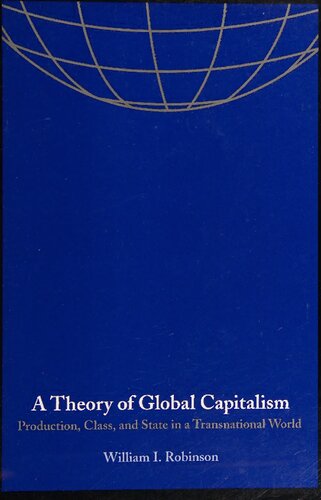(Ebook) A Theory of Global Capitalism. Production, Class, and State in a Transnational World by William I. Robinson ISBN 9780801878848, 9780801879272, 9782003018299, 0801878845, 0801879272, 2003018298
In this book, sociologist William I. Robinson offers a theory of globalization that follows the rise of a new capitalist class and a transnational state. Growing beyond national boundaries, this new class comprises a global system in which Japanese capitalists are just as comfortable investing in Latin America as North Americans are in Southeast Asia. Their development of global, interconnected industries and businesses make them drivers of world capitalism.Robinson explains how global capital mobility has allowed capital to reorganize production worldwide in accordance with a whole range of considerations that allow for maximizing profit making opportunities. As a result, production systems that were once located in a single country have been fragmented and integrated externally into new globalized circuits of accumulation. What this means, however, is not simply that factories are located overseas where labor might be cheaper, but rather that the whole production process is broken down into smaller parts and each of those parts moved to a different country, depending on where investment might be highest. Yet at the same time, this worldwide decentralization and fragmentation of the production process has taken place alongside the centralization of command and control of the global economy in transnational capital.In turn, this economic organization finds a political counterpart in the rise of a transnational state. The leaders of global businesses and industries think about themselves and how they live in new ways. Hegemony in the twenty-first century, Robinson argues, will be exercised not by a particular nation-state but by this new global ruling class through the machinery of this transnational state. Robinson observes, for example, that global elites, regardless of their nationality, increasingly tend to share similar lifestyles and interact through expanding networks of the transnational state.
*Free conversion of into popular formats such as PDF, DOCX, DOC, AZW, EPUB, and MOBI after payment.


